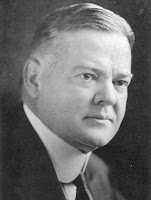 Herbert Clark Hoover (August 10, 1874 – October 20, 1964) was the 31st President of the United States (1929–1933). Hoover was originally a professional mining engineer and author. As the United States Secretary of Commerce in the 1920s under Presidents Warren Harding and Calvin Coolidge, he promoted partnerships between government and business under the rubric "economic modernization". In the presidential election of 1928, Hoover easily won the Republican nomination, despite having no previous elected office experience. Hoover is the most recent cabinet secretary to be elected President of the United States, as well as one of only two Presidents (along with William Howard Taft) to have been elected without previous electoral experience or high military rank. America was prosperous and optimistic at the time, leading to a landslide victory for Hoover over Democrat Al Smith.
Herbert Clark Hoover (August 10, 1874 – October 20, 1964) was the 31st President of the United States (1929–1933). Hoover was originally a professional mining engineer and author. As the United States Secretary of Commerce in the 1920s under Presidents Warren Harding and Calvin Coolidge, he promoted partnerships between government and business under the rubric "economic modernization". In the presidential election of 1928, Hoover easily won the Republican nomination, despite having no previous elected office experience. Hoover is the most recent cabinet secretary to be elected President of the United States, as well as one of only two Presidents (along with William Howard Taft) to have been elected without previous electoral experience or high military rank. America was prosperous and optimistic at the time, leading to a landslide victory for Hoover over Democrat Al Smith. James Earl "Jimmy" Carter, Jr. (born October 1, 1924) is an American politician who served as the 39th President of the United States (1977–1981) and was the recipient of the 2002 Nobel Peace Prize, the only U.S. President to have received the Prize after leaving office. Before he became President, Carter served two terms as a Georgia State Senator and one as Governor of Georgia (1971–1975), and was a peanut farmer and naval officer.
James Earl "Jimmy" Carter, Jr. (born October 1, 1924) is an American politician who served as the 39th President of the United States (1977–1981) and was the recipient of the 2002 Nobel Peace Prize, the only U.S. President to have received the Prize after leaving office. Before he became President, Carter served two terms as a Georgia State Senator and one as Governor of Georgia (1971–1975), and was a peanut farmer and naval officer.As President, Carter created two new cabinet-level departments: the Department of Energy and the Department of Education. He established a national energy policy that included conservation, price control, and new technology. In foreign affairs, Carter pursued the Camp David Accords, the Panama Canal Treaties, the second round of Strategic Arms Limitation Talks (SALT II), and returned the Panama Canal Zone to Panama.
Throughout his career, Carter strongly emphasized human rights. He took office during a period of international stagflation, which persisted throughout his term. The end of his presidential tenure was marked by the 1979–1981 Iran hostage crisis, the 1979 energy crisis, the Three Mile Island nuclear accident, the Soviet invasion of Afghanistan (at the end of 1979), and the 1980 eruption of Mount St. Helens.
By 1980, Carter's popularity had eroded. He survived a primary challenge against Ted Kennedy for the Democratic Party nomination in the 1980 election, but lost the election to Republican candidate Ronald Reagan. On January 20, 1981, minutes after Carter's term in office ended, the 52 U.S. captives held at the U.S. embassy in Iran were released, ending the 444-day Iran hostage crisis.
